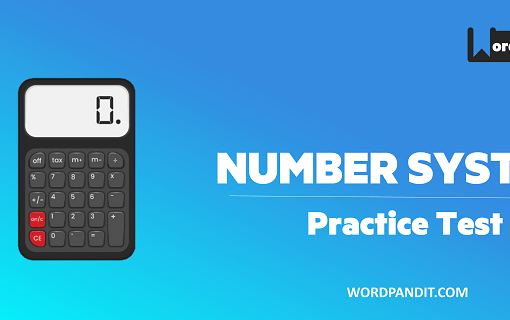- The test assesses your understanding of No. System.
- Questions belong to the very easy to easy difficulty range.
- Low scores point to a flaw in basic understanding of the concepts.
Number System Basics: Test 3
Congratulations - you have completed Number System Basics: Test 3.You scored %%SCORE%% out of %%TOTAL%%.You correct answer percentage: %%PERCENTAGE%% .Your performance has been rated as %%RATING%%
Your answers are highlighted below.
Question 1 |
In a mess, there are number of students having fun with their meal. The total number of students in the Mess is a two digit number and that number is a prime number. Keeping this in mind, which of the following could be the ratio of boys vs number of girls
7: 8 | |
14: 15 | |
25: 26 | |
None of these |
Question 1 Explanation:
Given that the total number of students is a prime number,
the given ratio will be the exact number of boys and girl students,
so using the answer options, we can easily
find the ratio by adding and checking:
Option A: 7+8 = 15 not a prime number
Option C: 25+26 = 51, not a prime number
Option B: 14+15= 29 is a prime number, so option b is the right answer.
the given ratio will be the exact number of boys and girl students,
so using the answer options, we can easily
find the ratio by adding and checking:
Option A: 7+8 = 15 not a prime number
Option C: 25+26 = 51, not a prime number
Option B: 14+15= 29 is a prime number, so option b is the right answer.
Question 2 |
How many fractions in the form of the (p/q) (q not equal to zero) are there between 3/4 and 4/5?
1 | |
56 | |
Infinite | |
None of these |
Question 2 Explanation:
The right answer is infinite because between two
rational numbers there exist infinite number of rational numbers
rational numbers there exist infinite number of rational numbers
Question 3 |
If we have two numbers r and r + 1 (both are prime numbers), then what can be said about r - 1?
It is a perfect number | |
It is a composite number | |
Its square is a composite number. | |
It has only 1 factor |
Question 3 Explanation:
It is given that r and r+1 are prime numbers.
This means r has to be 2, otherwise this is not possible.
r-1=1, and it is neither prime nor composite,
and it has only one factor.
This means r has to be 2, otherwise this is not possible.
r-1=1, and it is neither prime nor composite,
and it has only one factor.
Question 4 |
If p is prime number greater than 7 then what can we say about the divisibility of p2 -1?
Number divisible by 5 | |
Number is not divisible by 5 | |
Number must be divisible by 6 | |
None |
Question 4 Explanation:
Since it is given that the prime number which is greater than the 7, let us consider one such number: 11
So if p = 11 then p2 -1=120
which is divisible by 5,6
P=13, 169-1=168 not divisible by 5 but divisible by 6
P=17, 289-1=288 not divisible by 5 but divisible by 6
So the right answer is option 3.
which is divisible by 5,6
P=13, 169-1=168 not divisible by 5 but divisible by 6
P=17, 289-1=288 not divisible by 5 but divisible by 6
So the right answer is option 3.
Question 5 |
If s is the summation of a two digit number and the number formed by reversing its digits, then which of the following is correct about S?(i) S may be divisible by 11
(ii) S must be divisible by 11
(iii) S is an odd number
Only (i) and (ii) | |
Only (ii) | |
Only (ii) & (iii) | |
None of these |
Question 5 Explanation:
Let a two digit number be 'ab' = 10a + b (here a is not equal to 0)
S = (10a + b) + (10b + a) =11(a+b)
From this we can infer that S will always be divisible by 11, making statement (ii) correct.
And S is odd or even depends on (a+b),
because if it is even then S would be even and if it is odd then S would be odd as odd*odd=odd and odd*even=even.
S = (10a + b) + (10b + a) =11(a+b)
From this we can infer that S will always be divisible by 11, making statement (ii) correct.
And S is odd or even depends on (a+b),
because if it is even then S would be even and if it is odd then S would be odd as odd*odd=odd and odd*even=even.
Once you are finished, click the button below. Any items you have not completed will be marked incorrect.
There are 5 questions to complete.
List |













